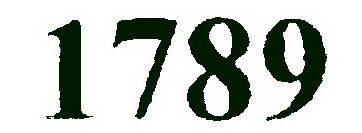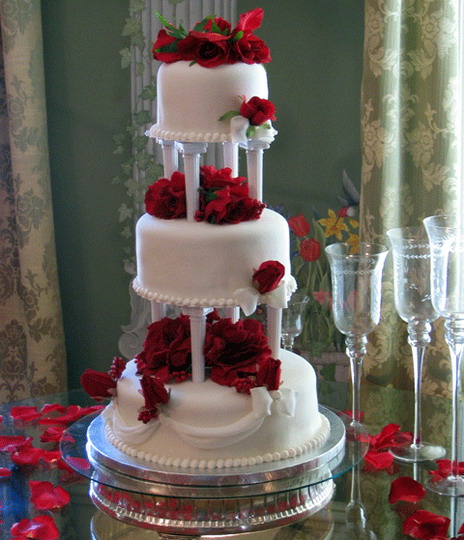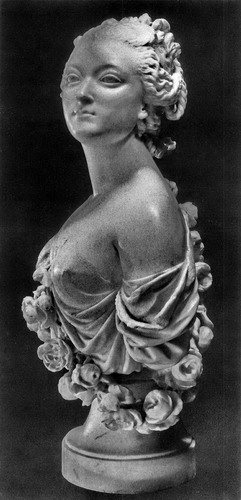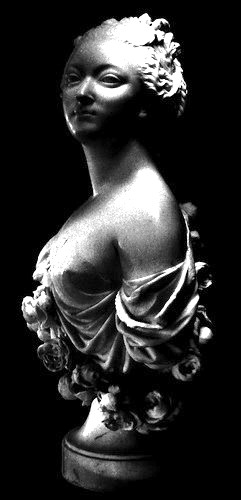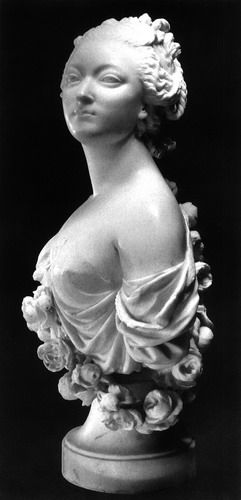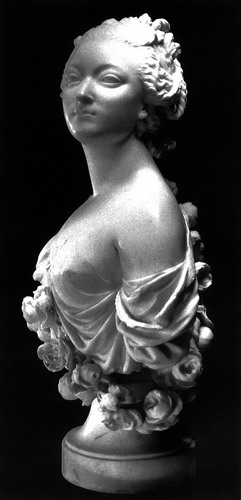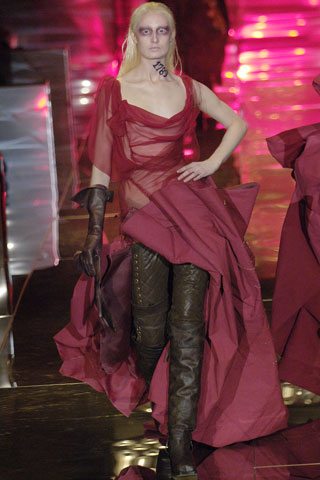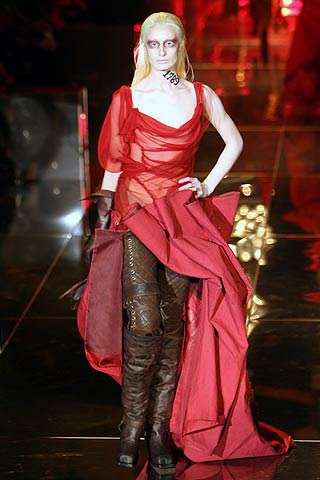YES, that was the first year of the French Revolution, and what follows is my own arrangement of quotes from and about the Revolution, with an emphasis on not just
the increased rights and privileges of the so-called common people, but of women in particular...
One opinion pervaded the whole company, that they are on the eve of some great revolution in the government. [A] great ferment amongst all ranks of men … and a strong leaven of liberty, increasing every hour since the American revolution, altogether form a combination of circumstances that promise ere long to ferment into motion if some master hand of very superior talents, and inflexible courage is not found at the helm to guide evens instead of being driven by them.
-Arthur Young, turn-of-the18th-century English writer, written in Paris on October 17, 1787.
France is in fermentation: whether the product will be wine or vinegar is as yet uncertain.
-George Christoph Lichtenberg, late-18th-century German writer, in Notebook J: 1789-1793, Aphorism 241, The Waste Books, translated by R.J. Hollingdale (1990).
Arthur Schopenhauer, the so-called “Pessimist Philosopher” of mid-19th-century Germany, had much to say in regard to the growing social freedoms of women in Western Europe, and in his essay titled “Of Women,” he asked a provocative question about the times in which he lived:
Was it not the case in France that the influence of women, which steadily increased from the time of Louis XIII, was to blame for that gradual corruption of the Court and the Government, and which brought about the Revolution of 1789, of which all subsequent disturbances have been the result? However that may be, the false position which women occupy nowadays, demonstrated as it is, in the most glaring way, by the institution of the “lady,” is a fundamental defect in our social scheme, and this defect, proceeding from the very heart of it, must, by its very nature, spread its irritating and burdensome influence in all directions.
-The Essays of Arthur Schopenhauer: Studies in Pessimism (1851), translated by T. Bailey Saunders (1891), and slightly modernized for clarity by me.
The collaborating history enthusiasts who have edited the Wikipedia article on the Counter-Enlightenment have agreed on this characterization of the age in which Schopenhauer had lived and about which he had written:
By the middle of the nineteenth century, the memory of the French Revolution was fading and Romanticism had more or less run its course. In this optimistic age of science and industry, there were few critics of the Enlightenment, and few explicit defenders. The German philosopher Friedrich Nietzsche is a notable (and highly influential) exception. After an initial defense of the Enlightenment during his so-called 'middle period' (late-1870s to early 1880s), Nietzsche turned vehemently against it and subscribed to the earlier view of conservative Counter-Revolutionaries like [the English writer and statesman Edmund] Burke and [the French writer and statesman Joseph de] Maistre, who blamed the French Revolution (which Nietzsche always hated) on the Enlightenment.
-The “Counter-Enlightenment” article on the English-language version of Wikipedia—the only version with its own article on the subject, as of July 2008.
But this sentiment was also expressed by some of the French themselves, undoubtedly:
Whoever did not live in the years before 1789 does not know what a pleasure life can be.
-Charles-Maurice, duc de Talleyrand-Périgord, the “Prince of Diplomats,” who worked in the French government both before and after the Revolution, and who in 1815 was made the first Prime Minister of France; this quote is taken from the François Guizot Memoirs, Volume I, Chapter 6 (1858).
The ‘schedule of grievances’ (or Cahiers de doléances), presented at Versailles in May 1789, sought to do away with the division between the three orders, namely, the “First Estate,” or the clergy; the “Second Estate,” or the nobility; and the “Third Estate,” or the commoner. And this document stated outright that—
If rights were equal, all would have the same will.
The point was reiterated by the French Roman Catholic clergyman Emanuel-Joseph Sieyès, who said:
Remove the structure of privilege and the nation would be not less, but more.
-From the introduction to his essay, “What is the Third Estate?”, published in January 1789, in which he also asked these three questions and gave the answer for each:
What Is The Third Estate? Everything.
What Has It Been Until Now In The Political Order? Nothing.
What Does It Want To Be? Something.
And could not the same point be made for the women of the time? I return to the outside view of the subsequent German writers, and find that Nietzsche had indeed echoed Schopenhauer’s disdain for the Revolution, and it is no surprise that Nietzsche had rightly considered one of his primary philosophical predecessors. He wrote:
Ever since the French Revolution, women's influence in Europe has decreased to the same extent that their rights and ambitions have increased; and thus the “emancipation of women,” in so far as women themselves (and not only shallow males) are demanding and encouraging it, turns out to be a curious symptom of increasing weakness and dullness in the most womanly instincts. There is stupidity in this movement, an almost masculine stupidity, which a truly womanly woman (who is always a clever woman) would have to be utterly ashamed of.
-Friedrich Nietzsche, Beyond Good and Evil, Part Seven: “Our Virtues,” Section 239, (1886), translated by Walter Kaufmann (1967).
But to offer a good response, I will summon this one, from the late-18th century French novelist, Honoré de Balzac, who regarded a certain group of ladies, yes ladies, and wonderfully defined them when he asked:
At this moment, who would not remain persuaded that these women were virtuous? Are they not the flower of the country? Are they all not fresh, ravishing, intoxicating with beauty, youth, life and love? To believe in their virtue is a kind of social religion; because they are the ornament of the world and the glory of France.
-Honoré de Balzac, The Physiology of Marriage, “Meditation II: Marriage Statistics,” 1829, translated by Joseph Walker McSpadden (1901).
But, I will now juxtapose that point with this one, and then interweave them all with some others… First, from Denis Diderot, one of two chief editors of the Encyclopedia, perhaps the most representative work of the Enlightenment, as it was put together as a sort of comprehensive, dare I say, Bible of reason and science—and I use that metaphor just to add yet one more layer of irony to this layer cake. But here is what Monsieur Diderot had to say of women in an essay of his own:
Impenetrable in their dissimulation, cruel in their vengeance, tenacious in their purposes, unscrupulous as to their methods, animated by profound and hidden hatred for the tyranny of man—it is as though there exists among them an ever-present conspiracy toward domination, a sort of alliance like that subsisting among the priests of every country.
-Denis Diderot, “On Women” (1772), from the selected volume Diderot and the Encyclopædists, translated by John Morley (1884).
But wait—does he mean a conspiracy toward becoming dominant, or against being dominated?? I’m really not sure! But either way it remains doubly offensive, no?
This, however, is one perspective along the same lines:
I am afraid that women appreciate cruelty, downright cruelty, more than anything else. They have wonderfully primitive instincts. We have emancipated them, but they remain slaves looking for their masters all the same. They love being dominated.
-The fictional character Lord Henry Wotton, a nobleman featured from Irish writer Oscar Wilde’s novel, The Picture of Dorian Gray (1890).
Again, this follows that same line of thinking we heard from Schopenhauer, whom I will invoke once again, knowing full well that this may cause a thousand of computer screens to be kicked off a thousand desktops by a thousand heels:
[The fact that] woman is by nature meant to obey may be seen by the fact that every woman who is placed in the unnatural position of complete independence, immediately attaches herself to some man, by whom she allows herself to be guided and ruled. It is because she needs a lord and master. If she is young, it will be a lover; if she is old, a priest.
-The Essays of Arthur Schopenhauer: Studies in Pessimism (1851), translated by T. Bailey Saunders (1891).
And that is parallel to a point made by the Russian novelist Dostoyevsky—only he spoke of MAN being the one looking for an object to which he could give such devotion! Hear this, and note the religious connection yet again:
So long as man remains free he strives for nothing so incessantly and so painfully as to find someone to worship. But man seeks to worship what is established beyond dispute, so that all men would agree at once to worship it. For these pitiful creatures are concerned not only to find what one or the other can worship, but to find community of worship is the chief misery of every man individually and of all humanity from the beginning of time.
-The fictional character Alyosha Karamazov, a young religious monk featured in Russian novelist Fyodor Dostoyevsky’s The Brothers Karamazov, Part II, Book Five: “Pro and Contra,” Chapter 5: “The Grand Inquisitor” (1880).
Can love be a man's religion, and woman be his God—or Goddess, as it were? Hmmm:
We justly consider women to be weaker than ourselves, and yet we are governed by them.
-Nicolas de Chamfort, late-18th-century French writer
Gerald Arbuthnot: How then can women have so much power as you say they have?
Lord Illingworth: The history of women is the history of the worst form of tyranny the world has ever known. The tyranny of the weak over the strong. It is the only tyranny that lasts.
-Two characters from Oscar Wilde’s play, A Woman of No Importance (1893)
Women are never stronger than when they arm themselves with their weaknesses.
-Madame Marie Anne du Deffand, mid-18th-century French intellectual
But to turn it back to the opposing view...
Love is an emotion that is based on an opinion of women that is impossible for those who have had any experience with them.
-H.L. Mencken, early-20th-century American journalist
Ouch! Oh, that DOES IT!!!
I am way too much of a romantic for all of this twisted, inconsistent torment...
So how's about some pictures?
The Dior Spring '06 Couture show is utterly apropos, once again... |
|
